The Punk Rock of Comedy: Why the Alt Scene Represents the Best of NYC
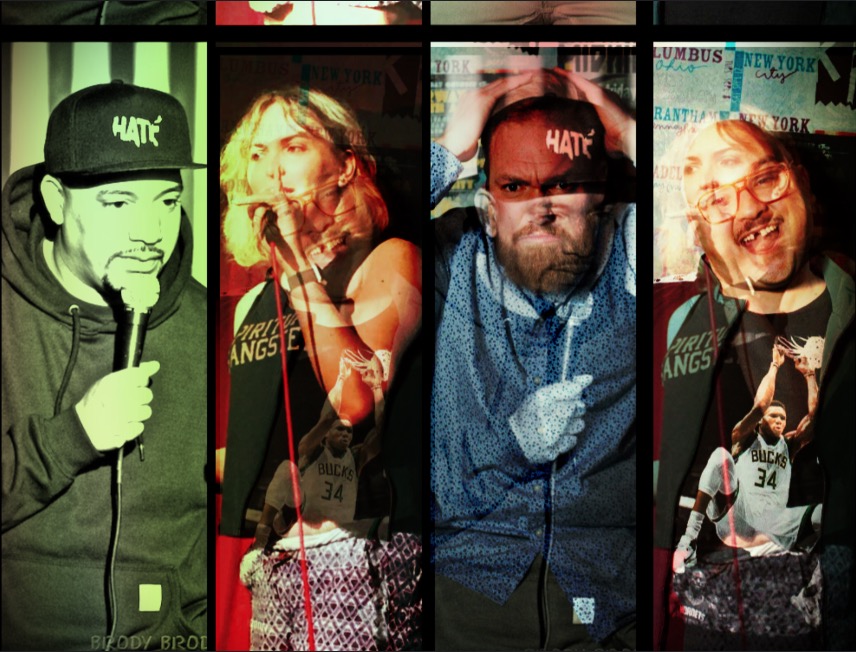

Michael Stahl is a freelance journalist, writer and editor based in Queens, New York.
In the bar of The Knitting Factory, a performing arts venue in Williamsburg, Brooklyn, about 130 tightly packed attendees face a small stage centered on the western wall, waiting for the comedy to begin. Taking the mic at 9:15 on this Sunday evening is cohost Kenny DeForest, a blonde-haired, heavy-bearded dude originally from Chicago, whose height and posture calls Conan O’Brien to mind.
“I’ve just been sitting around all day watching the NBA Playoffs and smoking weed,” he confesses, pulling laughs.
DeForest along with Clark Jones and Will Miles, two comedy veterans who are black, produce and host Comedy At The Knitting Factory. The free weekly show, founded by Hannibal Buress in the late ’00s, is both upbeat and laid back, like Buress himself. It’s also considered a beacon of the city’s underground alternative comedy scene, with performances routinely featuring comics of diverse experience levels, as well as birth origins, shapes and sizes—thus, voices, too. It’s the best of Sanctuary-City New York, come hilariously to life.
DeForest introduces the first comic on the bill, Stavros Halkias, a short, heavyset guy with a shaved head and missing front tooth, shamefully lost in a recent bout with a chicken bone. On his t-shirt is the basketball player nicknamed “The Greek Freak,” hammering home Halkias’s heritage as hard as the depicted dunk. He’ll be followed by a black female performer from Atlanta, two Jewish women, a gay Iranian-American man, another Midwestern white guy, and a black male in town from South Africa. Some, like Shalewa Sharpe, are up-and-comers. Others, like Ilana Glazer from Comedy Central’s “Broad City,” who’s working on new material, are so recognizable that opportunistic smart phones pop up in the crowd once they’re onstage.
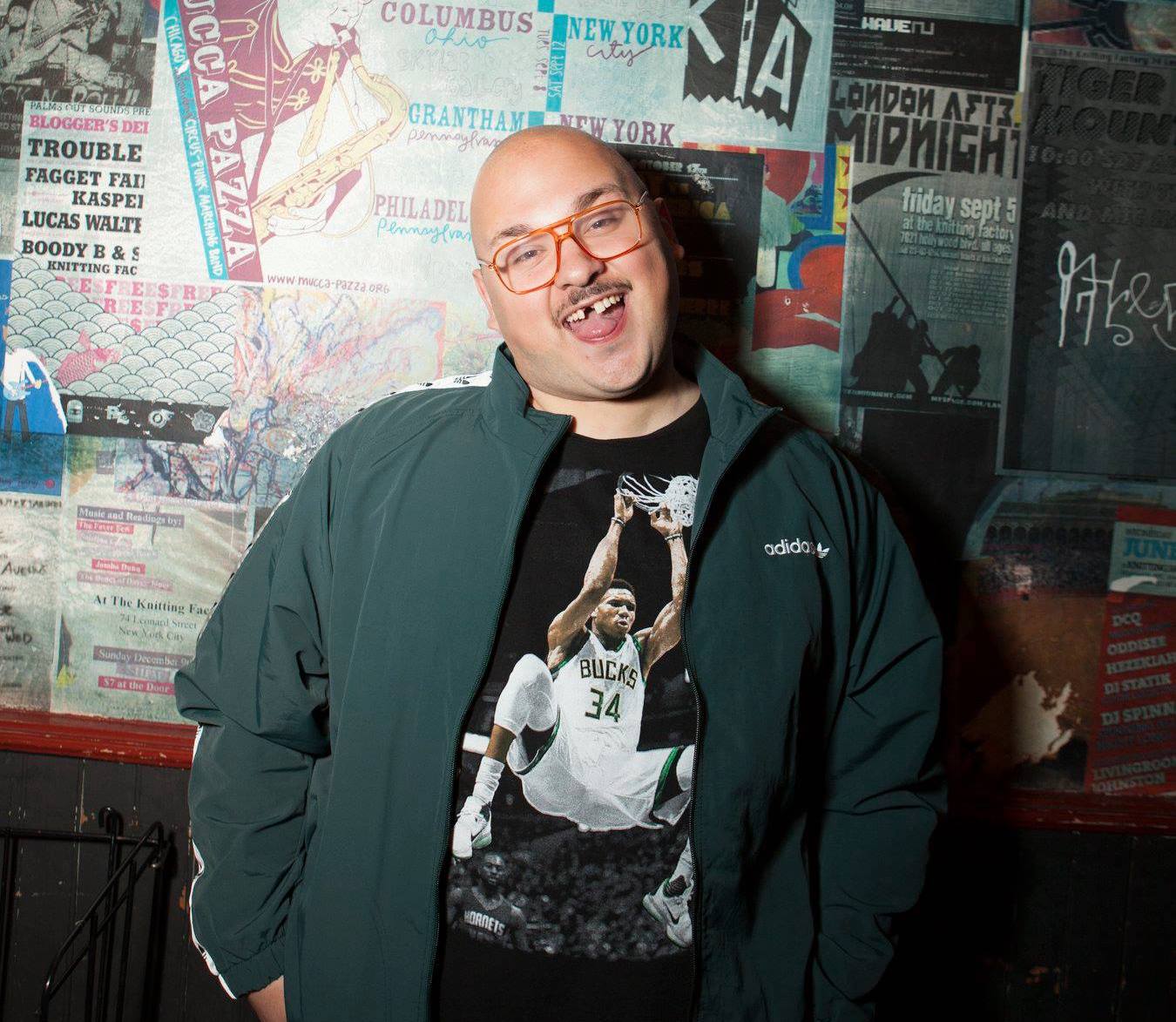
Stavros Halkias at The Knitting Factory. Photo by Yoko Haraoka.
Halkias bemoans his physical appearance and bad luck with the ladies in a bit: “They say love is blind… But casual sex has the eyesight of a fighter pilot.”
A mighty wind of laughter rushes the stage.
Alternative comedy—or “alt comedy” for short—is about as old as modern stand-up itself, which began in Vaudeville shows during the early 20th century. Where Vaudeville was commercially vanilla, the comedians performing between stripteases over in burlesque houses, however, emerged dirtier and edgier.
But alt comics today aren’t necessarily obscene, nor are they required to incorporate a bevy of props, musical instruments, or costumes into their acts, like many casual comedy fans presume. Sure, Aparna Nancherla busted out a PowerPoint presentation in her recent Netflix special, Dimitri Martin had his keytar, and, going back a few decades, Steve Martin put that fake arrow through his head, but those add-ons simply provided an off-center means of comedically presenting their standpoints. Many currently in the New York scene perceive the “alt-comedy” label as just that—a label; one that simplifies, even pigeonholes the community’s pervasive creativity that welcomes all players.
“It’s the punk rock of comedy,” Petey DeAbreu, a comic from the Bronx, says of the alt-comedy community. DeAbreu produces his own weekly show at Better Days, otherwise a tapas restaurant and bar in the Lower East Side. The crowd there on Wednesday nights is fairly young and, like the performers, diverse. There’s no cover charge, nor a two-drink minimum, which is standard operating procedure at the more mainstream clubs, including Caroline’s in Times Square and the Comedy Cellar in Greenwich Village. With so much money handed over in those venues—and, sometimes, historic reputations to uphold—there’s added pressure on performers to deliver laughs at an assault-rifle pace. DeAbreu says some comics have confided to him that taking to mainstream stages feels like “clocking into a job with someone micromanaging every word you say.”
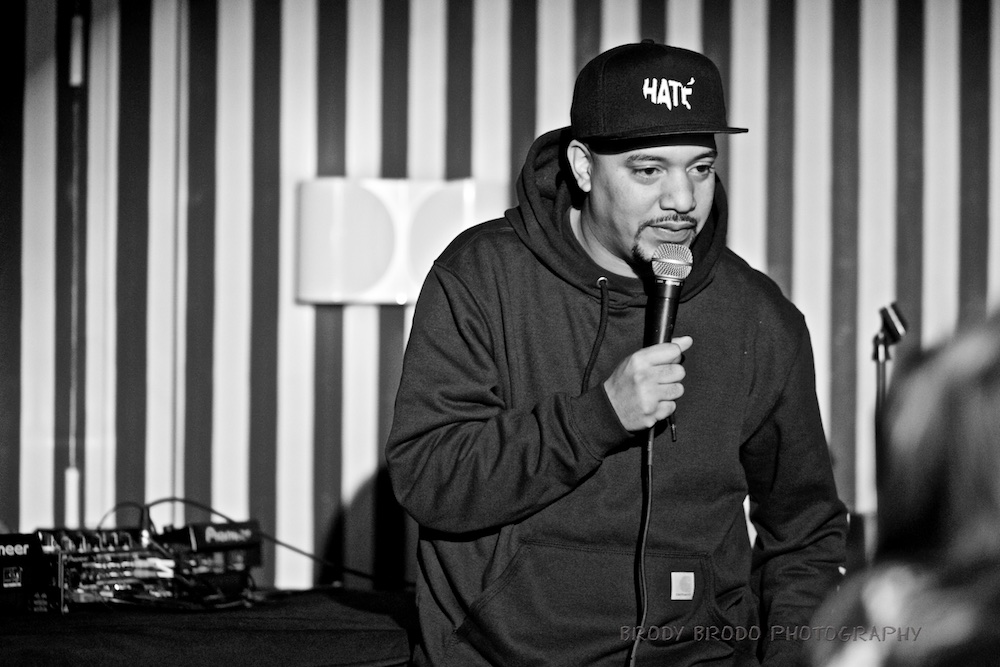
Petey DeAbreu. Photo by Brody Brodo
“A mainstream room wants your jokes; an alt room wants your unique perspective,” says Mehran Khaghani, the Iranian-American stand-up—and self-described “weapons-grade homosexual”—who performed that night at The Knitting Factory. Though Khaghani says truly representative diversity is only just beginning in comedy, it’s more prevalent in the alt community, where “there’s more room for the humanity to shine through.”
The adventurous alt comic may be more comfortable tackling controversial topics, and sometimes feels a sense of duty to do so. DeForest says when Buress handed him, Jones, and Miles the keys to Comedy At The Knitting Factory in November 2014, just as the Ferguson riots erupted, the interracial triumvirate of friends didn’t shy away from developing material about race relations, onstage and on the fly. “The spirit of the discussion is always jokes first,” DeForest says. “But it helps everyone verbalize [the issue] in their own minds.”
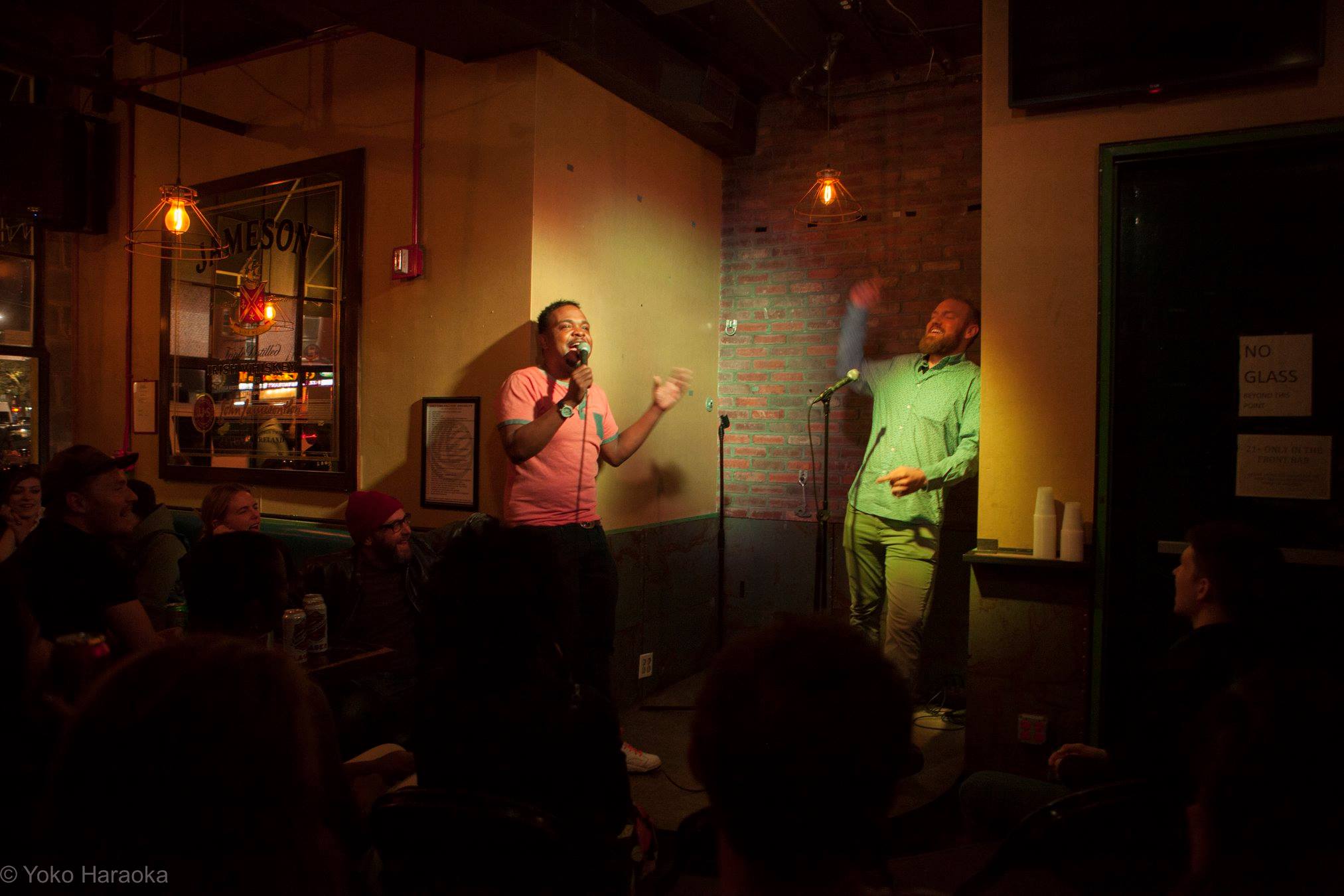
Clark Jones and Kenny Deforest at The Knitting Factory. Photo by Yoko Haraoka
Jeena Bloom, who is transgender and has been a part-time stand-up for two years, says, “I wouldn’t be doing comedy at all if there wasn’t an alt scene to do it in.” An influx of transgender performers are rising in the ranks of New York’s legion of comics, but with the exception of Patti Harrison—who appeared on “The Tonight Show” in the summer of 2017—none have enjoyed mainstream attention. “[Mainstream] clubs can be kind of conservative; they’re playing to out-of-towners and they have to play the numbers,” Bloom observes. “In the alt scene, those clubs are just a friendlier environment for me, personally.”
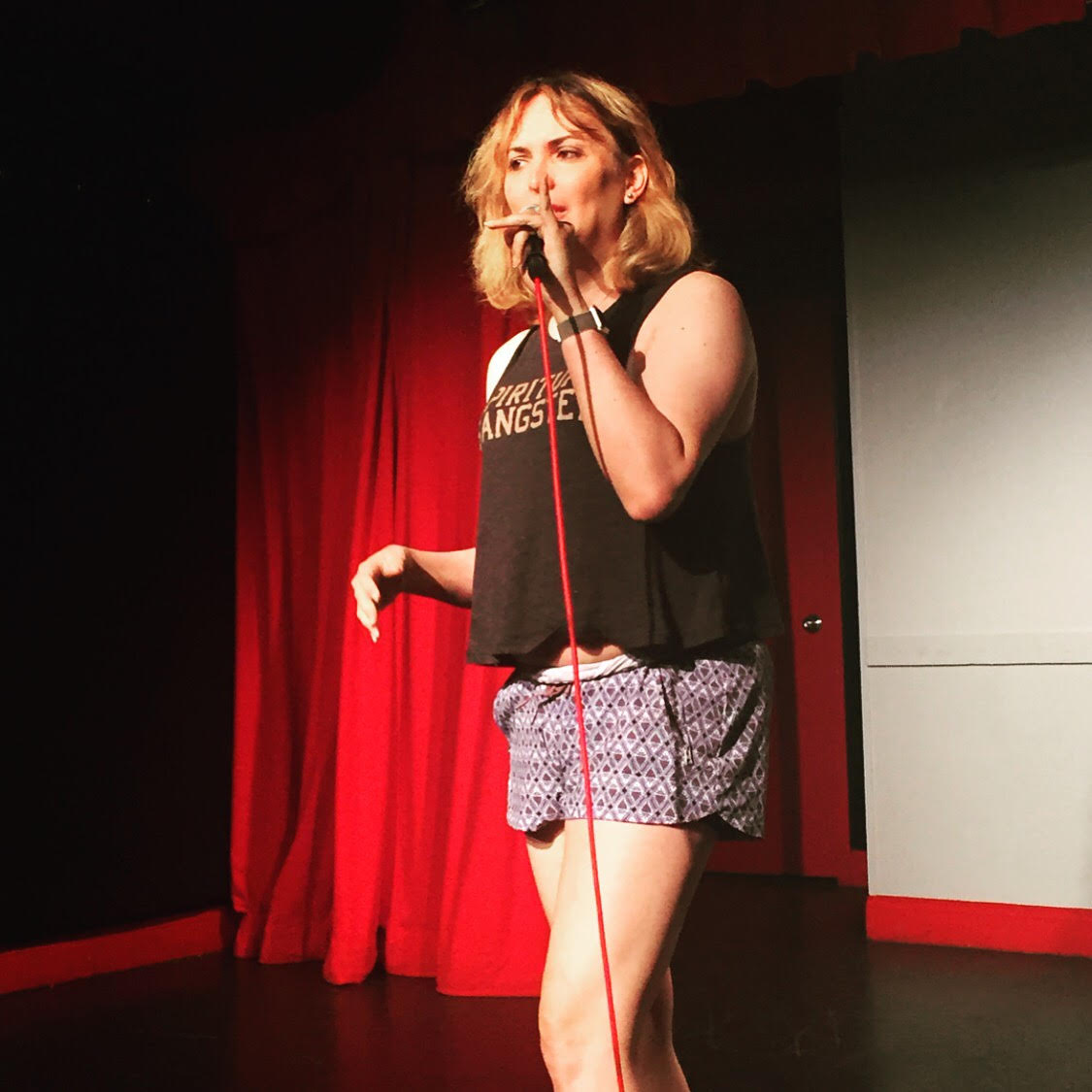
Jeena Bloom. Photo by Veronica Garza
That’s not to say that comics on the city’s mainstream stages are completely homogenous. Khaghani has been a regular at the Comedy Cellar for more than two years, but he passed an audition there after toiling in the Boston and New York alt scenes—the only communities that would accept him initially—for more than a decade. “I might’ve outgrown my alt pants,” he admits today. Back in the alt scene he was “more eager to fight conservatism” than he is now in mainstream clubs; however, Khaghani asserts the Comedy Cellar has made him a better all-around comic. “You have to be on your toes there,” he says, an attentiveness that carries him through performances in alt shows as well. (In spite of the lower stakes in the alt scene, all these comics said they’d be thrilled to make it onto the Comedy Cellar stage.)
New York’s not alone in its alt-comedy stylings, but the city’s scene certainly stands out. Clark Jones says Chicago’s is far more segregated than New York’s, though “it’s getting better.” DeForest, who recently did some dates in Los Angeles, says his impression was that every show there “has a purpose” for comics beyond the desire to just tell good jokes. Many performers in Hollywood are looking to “be seen” and parlay stand-up sets into acting gigs. Khaghani says Boston’s alt scene has grown of late, but its scale is microscopic compared to the expanse of New York’s, which continues to prosper, especially in the outer boroughs where new alt-favorable venues have popped up.
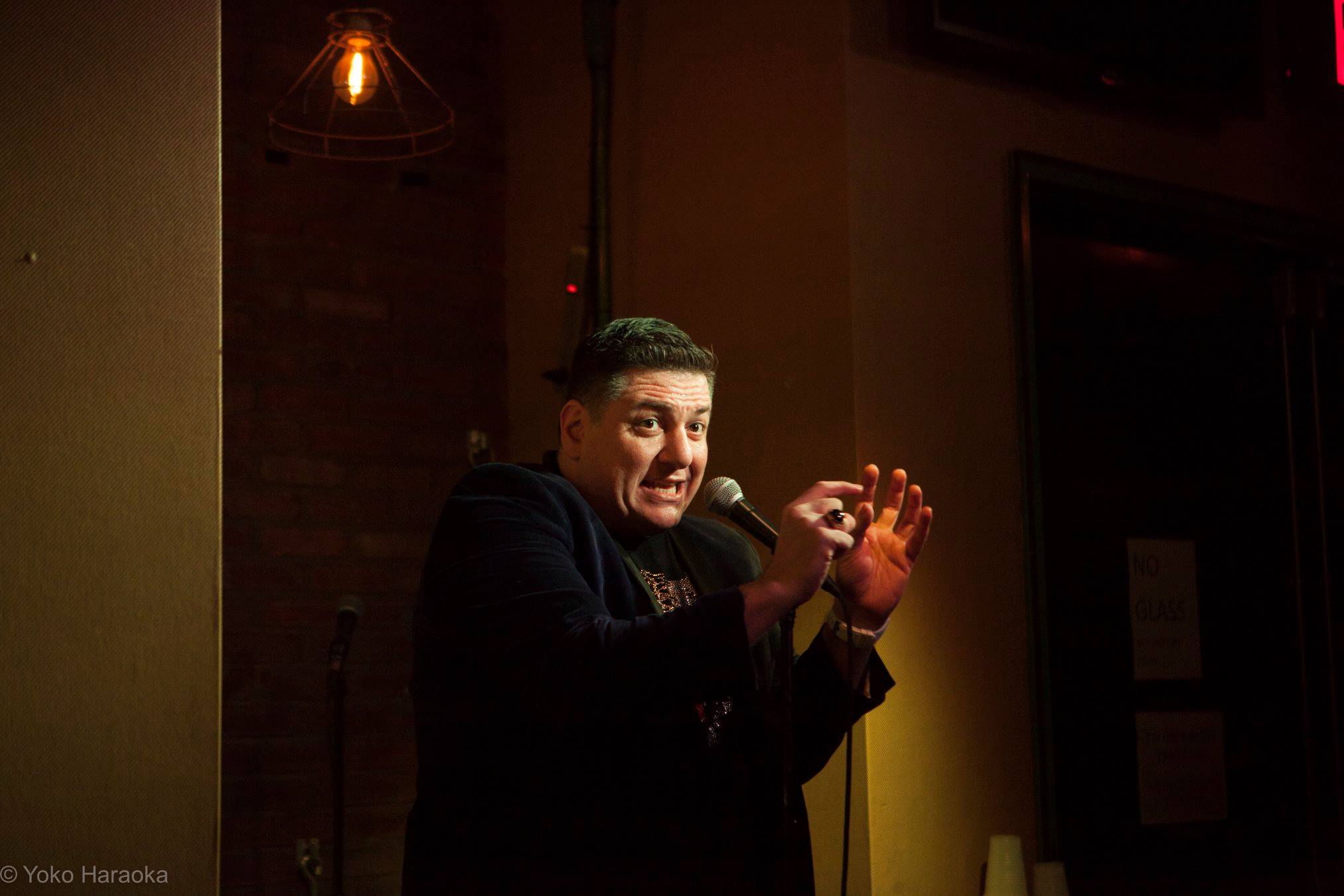
Mehran Khaghani. Photo by Yoko Haraoka
Complementing the Brooklyn scene, with its epicenter at Union Hall where alt-comedy shows are booked nightly, over in Queens there’s The Creek and the Cave, as well as Q.E.D., where owner Kambri Crews frequently books “experimental” shows, as she calls them. One Q.E.D. monthly presentation is “Madams of the Universe,” a feminist stand-up and storytelling show produced by Jourdain Searles, a black female who jokes about her disability onstage—she’s blind in her left eye and “really near-sighted” in her right.
Searles says she “wanted to create a show where, if people wanted to do feminist material or things that pertain to women and trans issues, it could be a safe space to do that kind of work.”
“Hearing perspectives from a diverse range of voices in the form of my peers has honestly changed my worldview more than anything else,” DeForest says. “Hearing the best talkers of any group concisely break down what life in their shoes is like is a great way to build empathy.”
At New York’s dynamic alt-comedy presentations you’ll also find improv and other variety shows. Props do sometimes turn up, though. In Brooklyn I saw a performance by Martin Urbano, a Hispanic American from the Texas border city of Brownsville, home to a converted Walmart that now houses 1,400 immigrant boys in federal custody. Urbano closed his set by handing a piece of paper with his jokes written on it to an audience member. As she read the lines into the mic, he lip-synched them while acting out her reactionary voice inflections and giggles, comedic timing be damned.
All in a night’s work.
Read more comedy news.
Michael Stahl
Latest posts by Michael Stahl (see all)
- The Punk Rock of Comedy: Why the Alt Scene Represents the Best of NYC - November 8, 2018
